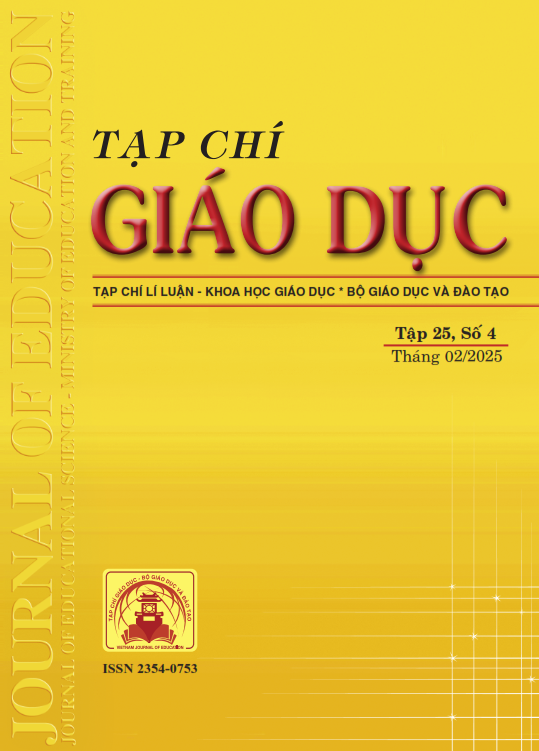Các yếu tố ảnh hưởng đến phát triển chuyên môn của giáo viên mầm non: Thực trạng và đề xuất
Tóm tắt
Professional development of preschool teachers not only keeps them updated and adaptable to societal changes but also guides their personal development, contributing to improving education quality in the modern context. Furthermore, professional development helps preschool teachers foster a lifelong learning mindset, encouraging them to continuously seek opportunities to learn, challenge themselves, and improve their teaching practices. When teachers understand their own learning needs while also meeting the requirements for professional growth, they create a positive and inspiring educational environment for children while enhancing their professional values. Using a quantitative research method including both closed-ended questions and open-ended questions, the survey involved 213 preschool teachers from various provinces/cities in Vietnam. The survey content focuses on practices related to professional development. It is shown that the comfort level of preschool teachers when participating in training, their motivation for personal development, and the policies and regulations for preschool education are statistically significant factors influencing their professional development. The findings of this study can serve as a practical foundation for proposing policies that promote the professional development of preschool teachers in the current period.
Tài liệu tham khảo
Bassok, D., Fitzpatrick, M., Greenberg, E., & Loeb, S. (2016). Within‐ and Between‐Sector Quality Differences in Early Childhood Education and Care. Child development, 87(5), 1627-1645. https://doi.org/10.1111/cdev.12551
Bộ GD-ĐT (2023). Báo cáo Đổi mới giáo dục mầm non giai đoạn 2023-2030, tầm nhìn đến 2045.
Bộ GD-ĐT (2024a). Báo cáo đánh giá kết quả 10 năm triển khai thực hiện Chương trình giáo dục mầm non.
Bộ GD-ĐT (2024b). Báo cáo về đổi mới, phát triển giáo dục mầm non đến năm 2030 tầm nhìn đến năm 2045. https://moet.gov.vn/giaoducquocdan/giao-duc-mam-non/Pages/Default.aspx?ItemID=9246
Eadie, P., Levickis, P., Murray, L., Page, J., Elek, C., & Church, A. (2021). Early childhood educators’ wellbeing during the COVID-19 pandemic. Early Childhood Education Journal, 49(5), 903-913.
Lê Thị Mai Hoa, Nguyễn Thanh Hà (2024). Giáo dục mầm non sau 10 năm thực hiện Nghị quyết 29-NQ/TW - Kết quả và định hướng trong giai đoạn mới. Tạp chí Giáo dục. https://tapchigiaoduc.edu.vn/article/88375/212/giao-duc-mam-non-sau-10-nam-thuc-hien-nghi-quyet-so-29-nq-tw-ket-qua-va-dinh-huong-trong-giai-doan-moi/
OECD (2018). Engaging Young Children: Lessons from Research about Quality in Early Childhood Education and Care, Starting Strong. OECD Publishing.
Powell, A., Langford, R., Albanese, P., Prentice, S., & Bezanson, K. (2020). Who cares for carers? How discursive constructions of care work marginalized early childhood educators in Ontario’s 2018 provincial election. Contemporary Issues in Early Childhood, 21(2), 153-164. https://doi.org/10.1177/1463949120928433
Taggart, G. (2016). Compassionate pedagogy: The ethics of care in early childhood professionalism. European Early Childhood Education Research Journal, 24(2), 173-185.
To, K., H., Yin, H., Tam, W. W. Y., & Keung, C. P. C. (2023). Principal leadership practices, professional learning communities, and teacher commitment in Hong Kong kindergartens: A multilevel SEM analysis. Educational Management Administration & Leadership, 51(4), 889-911.
Tải xuống
Đã Xuất bản
Cách trích dẫn
Số
Chuyên mục
Giấy phép

Tác phẩm này được cấp phép theo Ghi nhận tác giả của Creative Commons Giấy phép quốc tế 4.0 .












